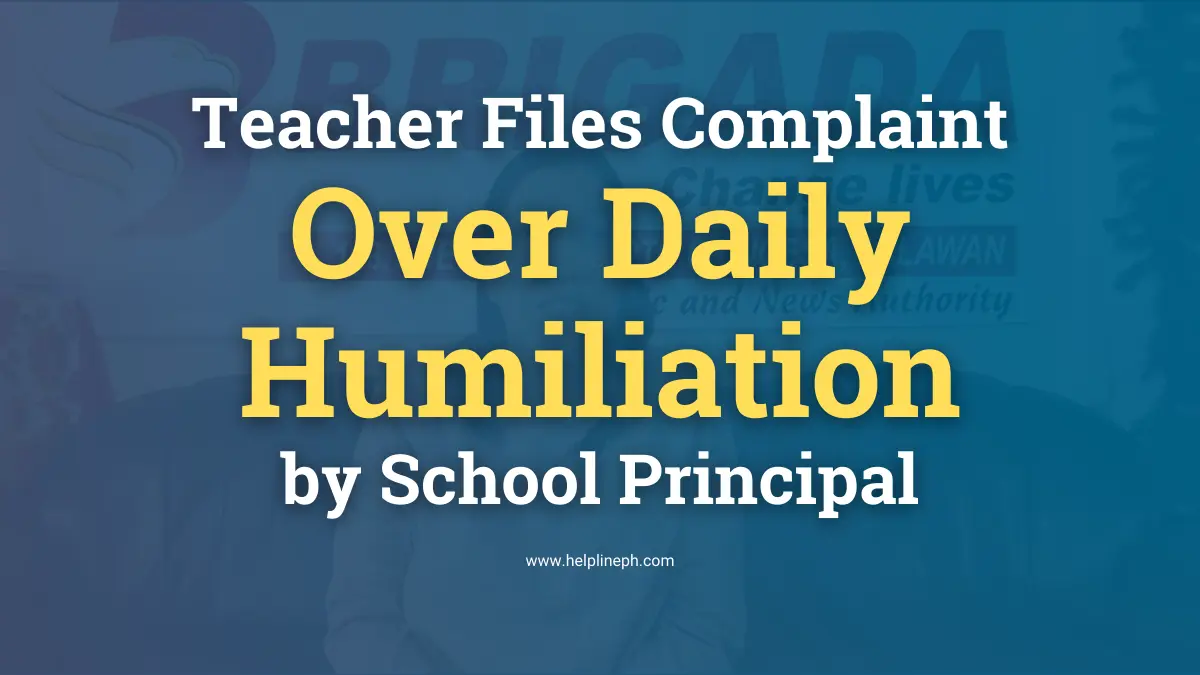Teacher Mary Hazel Austria from El Nido National High School has formally lodged a complaint against her school principal for continuous public humiliation. The alleged incidents occurred frequently in July and August, with the principal scolding Teacher Mary in front of other teachers and students at the school canteen.
The situation became worse when the principal started involving Teacher Mary’s child, who also studies at the same school. This crossed a line for the teacher, leading her to finally speak out despite her initial fears.
Teacher Mary Speaks Out
In an emotional statement, Teacher Mary shared her reasons for finally reporting the principal. “I think no one dares to speak up because we are all afraid of the principal. I was scared too, but after all the hurt she caused me, I’m no longer afraid to tell the truth… before, I couldn’t even tell my husband, but now I’ve shared everything with him,” Teacher Mary revealed.
The daily insults and public scolding made it unbearable for Teacher Mary to stay silent any longer. According to her, the principal’s actions made her feel powerless, and the public shaming in front of colleagues and students deeply affected her self-esteem and mental health. What made matters worse was when her child was dragged into the conflict, further increasing her emotional distress.
Teachers’ Association Expresses Concern
The National Association of Public Secondary School Heads Inc. (NAPSSHI) in Palawan expressed concern over the situation. They acknowledged the seriousness of Teacher Mary’s complaint and hoped for a fair resolution.
Efforts by Brigada News FM to contact the principal for comments have been unsuccessful, and as of now, there has been no official statement from the Department of Education (DepEd) in Palawan.
The Impact of Public Humiliation
Public humiliation in the workplace, especially in a school environment, can have long-lasting effects on an individual. It can lower a person’s morale, self-confidence, and emotional well-being. For teachers like Mary, who are expected to maintain professionalism and be role models for students, being humiliated by a superior in front of peers is especially damaging.
In a professional setting, it’s essential for leaders, like principals, to provide constructive feedback in private and handle conflicts in a respectful manner. Publicly shaming employees can create a toxic work environment, discourage productivity, and affect overall job satisfaction.
Fear of Retaliation
One of the reasons why many teachers, like Mary, hesitate to speak out against their superiors is the fear of retaliation. Teachers often feel that reporting a superior could lead to further mistreatment, isolation, or even career setbacks. This fear can create a culture of silence, where injustices go unaddressed, and abusive behavior continues unchecked.
Mary admitted that she was initially afraid of the consequences of speaking out. However, after enduring months of humiliation, she decided that she could no longer remain silent. Her decision to file a formal complaint is a brave step, as it highlights the importance of standing up against mistreatment, even when it feels risky.
What Can Be Done?
To prevent situations like this from happening, schools must promote a positive work culture where employees feel safe to voice their concerns without fear of retaliation. Open communication between teachers and school administrators is essential to resolving conflicts in a healthy and constructive way.
Additionally, there should be clear policies in place that protect teachers from workplace bullying or harassment. DepEd, as the governing body, plays a crucial role in ensuring that schools are safe spaces not just for students, but for teachers as well. Proper investigation and action should be taken to address complaints of abuse, and principals or school leaders found guilty of mistreatment should face appropriate consequences.
Importance of Mental Health Support for Teachers
Teachers, like everyone else, are vulnerable to stress and emotional exhaustion, especially when they are subjected to hostile environments. Mental health support, counseling, and a supportive workplace are vital in ensuring that teachers can perform their duties effectively without the burden of emotional and psychological stress.
It’s essential that teachers have access to mental health resources and support systems to help them cope with challenging work conditions. Schools should prioritize creating an environment that values the well-being of its staff as much as it values the education of its students.
The Role of DepEd
As the governing body, the Department of Education (DepEd) is responsible for maintaining a professional and respectful environment in all schools across the country. DepEd should ensure that complaints like Mary’s are taken seriously and that investigations are conducted fairly and promptly.
In cases where school administrators are found guilty of bullying or abusive behavior, DepEd should enforce disciplinary actions that serve as a deterrent to others. Moreover, regular training and workshops on leadership, communication, and conflict resolution can help principals and other school leaders develop skills that foster a positive and supportive school culture.
Final Thoughts
The case of Teacher Mary Hazel Austria sheds light on the struggles that some teachers face in their workplaces. While schools are institutions of learning, they are also workplaces where respect, professionalism, and fairness should be upheld.
For Teacher Mary, filing a formal complaint was a brave step toward justice. Her story serves as a reminder that no one should tolerate bullying or harassment, regardless of their position in the workplace.
Frequently Asked Questions (FAQs)
What steps can teachers take if they are being mistreated by their superiors?
Teachers should first try to address the issue directly with the individual involved, if possible. If the situation does not improve, they can file a formal complaint with the school administration or DepEd. Teachers should also document incidents of mistreatment and seek support from colleagues or teacher associations.
What are the effects of public humiliation in the workplace?
Public humiliation can lead to lowered self-esteem, increased stress, and mental health issues. It can also create a toxic work environment, reducing job satisfaction and productivity.
How can schools prevent workplace bullying?
Schools can prevent workplace bullying by establishing clear policies against harassment, providing training on respectful communication, and ensuring open channels of communication between staff and administrators.
What role does DepEd play in addressing workplace bullying?
DepEd is responsible for investigating complaints of workplace bullying and ensuring that schools maintain a respectful and professional environment. They should enforce disciplinary actions when necessary and provide support to both teachers and administrators.
Why is mental health support important for teachers?
Teachers face many challenges in their work, including stress from dealing with students and maintaining a professional environment. Mental health support can help them manage these pressures and continue performing their duties effectively. Schools should prioritize the mental well-being of their staff.
In summary, Teacher Mary’s story emphasizes the need for a respectful, professional, and supportive work environment in schools. Teachers, like all employees, deserve to be treated with dignity, and no one should endure public humiliation or workplace bullying.






